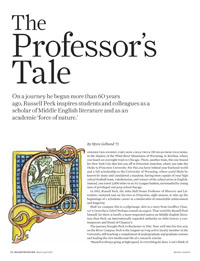Features
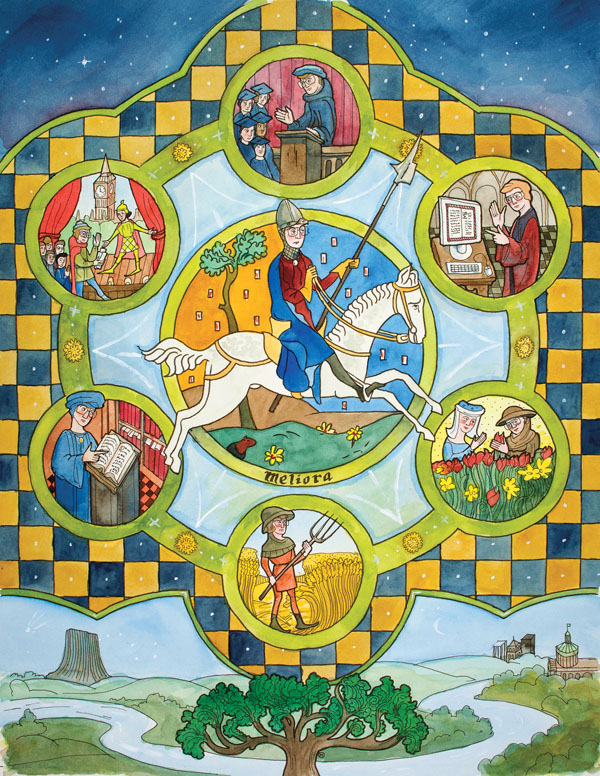 (Illustration: Michael Osadciw)
(Illustration: Michael Osadciw)Consider this journey. First, ride a milk truck 150 miles from your home, in the shadow of the Wind River Mountains of Wyoming, to Rawlins, where you board an overnight train to Chicago. There, another train, this one bound for New York City that lets you off at Princeton Junction, where you take the Dinky to Princeton University. For this you leave behind your boyhood world and a full scholarship to the University of Wyoming, where you’d likely be known by many and considered a standout, having been captain of your high school football team, valedictorian, and winner of the school prize in English. Instead, you travel 2,000 miles to an Ivy League bastion, surrounded by young men of privileged and prep school lineage.
In 1952, Russell Peck, the John Hall Deane Professor of Rhetoric and Literature, ventured east on his own to Princeton, sight unseen, to take up the beginnings of a scholastic career as a medievalist of remarkable achievement and longevity.
Shall we compare this to a pilgrimage, akin to a story from Geoffrey Chaucer’s Canterbury Tales? Perhaps consult an expert. That would be Russell Peck himself, for there is hardly a more respected source on Middle English literature than Peck, an internationally regarded authority on John Gower, a contemporary and friend of Chaucer’s.
The journey brought Peck to Rochester in 1961. Now well into his 51st year on the River Campus, Peck is the longest-serving active faculty member at the University, still teaching a complement of undergraduate and graduate courses and leading the rich intellectual life of a research scholar.
The Roles of Russell Peck
When asked to summarize Russell Peck in one word, colleagues and friends describe him as “energetic,” “enthusiastic,” “intellectually curious,” “persuasive,” “persistent,” “generous,” “exuberant,” “radiant,” “indefatigable,” and “a rapidly walking library.” It is, in short, a long list. Here are a few of his many facets:
Scholar
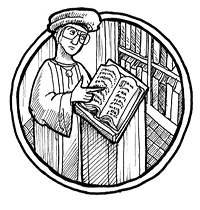 (Illustration: Michael Osadciw)
(Illustration: Michael Osadciw)Widely respected as a scholar of Middle English literature, Peck is an internationally recognized authority on Geoffrey Chaucer, the 14th-century author of The Canterbury Tales; the poet John Gower, a contemporary and friend of Chaucer’s; William Langland, the presumed author of the 14th-century narrative poem Piers Plowman; and Thomas Malory, the 15th-century writer who’s credited with first bringing together Le Morte d'Arthur, a canonical text of the Arthur legend.
His work has been recognized by the John Gower Society, the National Endowment for the Humanities, the Guggenheim Foundation, and other national humanities and academic associations. He was named the John Hall Deane Professor of Rhetoric and Literature in 1985.
His wide-ranging command of his field has long been a marvel to many.
“I never had a class with Russell, but I remember being in an absolutely packed house at Hubbell Auditorium, when he delivered a lecture on grammar that was illustrated entirely with slides of dragons,” recalls Don Chew ’79S (MBA), ’83 (PhD). “He went through every part of speech and form of grammar with dragon images. It was hilarious, silly, and amazing. Only Russell could have pulled that off.”
Years later, when Peck asked Chew to help manage the finances of the TEAMS project, all Chew asked for in return was a copy of that dragon lecture. “Russell said he’d tossed it out. I was crushed. I can’t imagine how many such things he’s done over the years.”
He’s also been known to take his scholarship quite seriously, showing up in a cast for graduation in 1971 after injuring his arm jousting.
Farmer
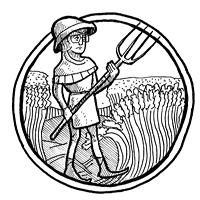 (Illustration: Michael Osadciw)
(Illustration: Michael Osadciw)Since the 1970s, the Pecks have owned a farm in Canada’s upper Ottawa Valley, where Russell, Ruth, and their three children, Demaree, Nathan, and Gunther, continue to maintain a working farm.
Teacher
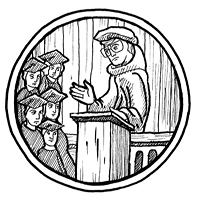 (Illustration: Michael Osadciw)
(Illustration: Michael Osadciw)Recognized for his teaching by generations of Rochester students, Peck has been widely honored by national organizations, including the Council for the Advancement and Support of Education and the Danforth Foundation, as well as by the University, where he’s received the Edward Peck Curtis Award for Excellence in Undergraduate Teaching; the Robert and Pamela Goergen Award for Excellence in Undergraduate Teaching, the Students’ Association Professor of the Year award (1998); and the 2009 President’s Medal for Distinguished Service.
Always looking for ways to exemplify the notion that teaching can occur far beyond the classroom, he’s conducted courses at his family’s farm in Ontario, taken students to Stratford, Ontario, for a Shakespeare festival, and established a regular theater course in England during winter break. Former students remember cookouts at the Pecks’ home in Rochester, where Peck, accompanied by his wife, Ruth, on piano, was known to sing such songs such as “Goodbye, Forever, Saloon” from a prohibition hymnal.
Gardener
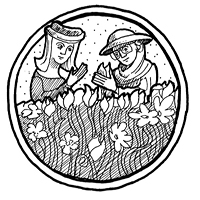 (Illustration: Michael Osadciw)
(Illustration: Michael Osadciw)At their home in Rochester, Russell and Ruth Peck are avid gardeners, tending peonies and other perennials that supply the flowers for the English department’s annual diploma ceremony.
Digital Entrepreneur
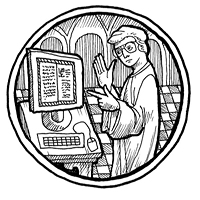 (Illustration: Michael Osadciw)
(Illustration: Michael Osadciw)In what he calls his most important work since arriving at Rochester, Peck is the founder and chief editor of a series that makes authoritative copies of medieval literature available to students and scholars. Concerned that works were in danger of being lost as they fell out of print or of languishing in libraries accessible only to scholars who could travel to work with them, Peck has been the driving force for the Middle English Text Series (METS), part of the Consortium for Teaching Middle Ages (TEAMS). The series, available online and perpetually in print copy, produces accurate, authoritative texts that can be read easily in the original Middle English. The series has grown to more than 80 volumes.
Ringmaster
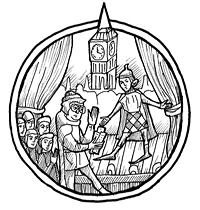 (Illustration: Michael Osadciw)
(Illustration: Michael Osadciw)Peck has long taken an interest in making sure he and his students know each other and the community in which they live. Organizing the first installment 30 years ago as the “I’d rather be in Rochester project,” Peck leads trips around the area, taking students to such sites as the Public Market, the Seneca Park Zoo, Lake Ontario, concerts, movie screenings, and others. Says Jarold Ramsey, professor emeritus of English: “[W]henever there was any celebrating in the name of literary study, Russell was your man.”
But he’s best known for organizing the English department’s annual diploma ceremony, a multimedia extravaganza that recognizes each of the 70-plus graduating seniors.
Says John Michael, professor and chair of English: “I always fear for Russell the week before graduation because he runs around at such a breakneck pace. The prospect of his giving up the diploma ceremony fills me with despair. No question, he is irreplaceable.”
“Russell is always going at high speed, in everything he does. I can’t think of another person who combines his range and his passion in the academic realm,” says John Michael, chair of the English department. “He’s phenomenal, in the sense that he is great. But he’s a phenomenon, a force of nature, intensely committed to everything he does.”
“Literary study is an exercise in vitality,” Peck wrote in a 2001 essay called “Teaching What Can’t Be Taught,” and there is no better proof than to see him as he leads students through rigorous course material, whether in the classroom for his storied lectures on the works of Chaucer, the jam-packed itinerary of his intensive Theatre in England course, or in devising forward-looking ways to share the vibrant literary history of the Middle Ages.
“His scholarship is distinctive because Russell is an exquisite teacher and a great scholar,” says Peter Lennie, senior vice president and the Robert L. and Mary L. Sproull Dean of the Faculty of Arts, Sciences, and Engineering. “But beyond that, he’s a source of inspiration to everyone. He has had such a fully vigorous career. He doesn’t let up, and he shows no sign of slowing down.”
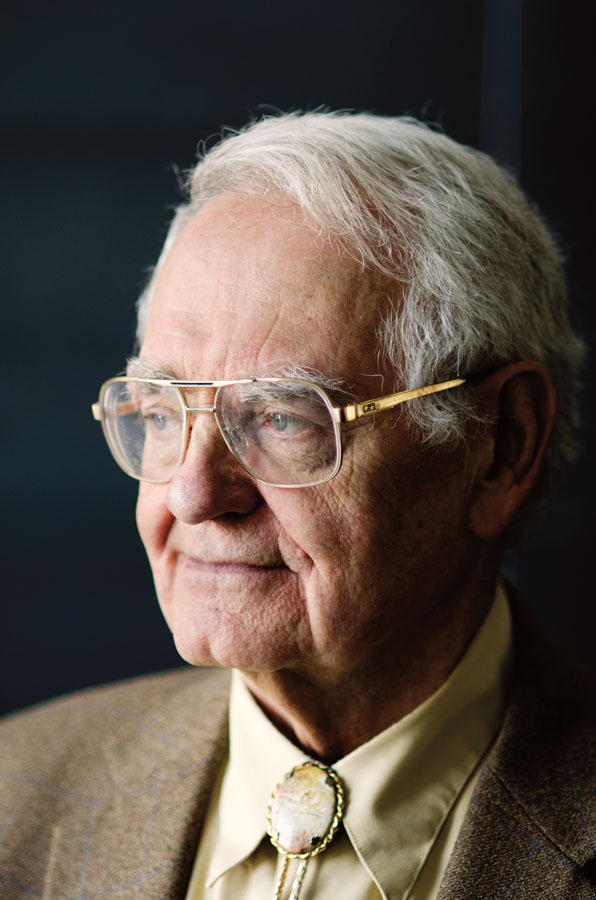 FACULTY OUTLOOK: In many ways, “he remains a young upstart,” say colleagues, noting Peck’s wide-ranging academic interests and commitment to students in the English department. (Photo: Adam Fenster)
FACULTY OUTLOOK: In many ways, “he remains a young upstart,” say colleagues, noting Peck’s wide-ranging academic interests and commitment to students in the English department. (Photo: Adam Fenster)Alan Lupack, curator of the Rossell Hope Robbins Library of medieval studies and the Camelot Project, puts it another way. “I suspect Russell lives in a world where days are longer than 24 hours. Also, I don’t know if he sleeps.”
Rochester was another step in Peck’s journey, and he arrived, once again, without a preview of the city or the campus, having accepted the job over the phone. “I was looking for somewhere with snow,” he says, no hint of irony in his voice. “That was part of the attraction. I turned down other offers. Rochester was at the top of my list.”
The snow may have added to Rochester’s appeal, but the vibrant music scene also figured strongly as Russell had met and married an accomplished pianist, Ruth Demaree, while in graduate school at Indiana University. Russell earned his PhD in Middle English language and literature, with a dissertation on “Number Symbolism and the Idea of Order in the Works of Geoffrey Chaucer,” while Ruth was a graduate student in music.
“I heard her perform Rachmaninoff’s Piano Concerto No. 2,” he says. “That was it for me.”
After finishing her master’s degree, Ruth went to Paris on a Fulbright fellowship to study piano at the Conservatoire National. Russell followed with a marriage proposal. They wed in June 1958 in Paris and spent their summer camping as they traveled through France.
Perhaps you detect a fairy tale quality. Need an expert? Once again that would be Peck, who has also devised and taught courses in Fairy Tale and Popular Culture and Myth and Fairy Tale.
“Russell is the world expert on Cinderella,” says Thomas Hahn, a longtime colleague in the English department. “The mark of a successful teacher is to be able to hear what’s going on in the culture in general. His fairy tales course is the best example of that. It deals with mythic patterns and large issues involving healing the soul. But there’s more going on. Really, he’s reconciling the world in those stories.”
Reflecting on the young man who alighted the train from Wyoming into the world of Ivy sophistication, Peck candidly says, “I wasn’t equipped to understand Princeton. I loved my classes, but I didn’t fully appreciate my total surroundings until I was ready to graduate.”
Isn’t that true for most of us? What outwardly may have seemed a young cowboy’s lack of sophistication and worldliness likely sprang from the same insecurity felt by nearly every college newbie. That experience has informed Peck’s approach from the outset of his academic career, allowing him to reach across disciplines and generations.
Once settled at Rochester, Peck made fast friends with new colleagues, including the acclaimed poet Hyam Plutzik, who succumbed to cancer five months later at the age of 50. First, the young medievalist took over Plutzik’s honors seminar in poetry, and, shortly after, became the first director of the Plutzik Poetry Series, started in the poet’s memory and which reached its milestone 50th year in 2012 (see page 38). Even though he handed off those duties after a few years, Peck remains devoted to the Plutzik Series and the many friendships he has cultivated through that connection.
Such relationships may explain why Peck, who always has time for students, for new ideas, and for colleagues, is cherished in the Rochester community.
“There are two really important things a university like Rochester can do for undergraduates,” Lennie says. “One is to provide a rich, residential experience where students are brought together with a diverse set of peers. The second is to find ways to offer opportunities to engage with faculty who change the way they think about the world. This is what defines Russell above all.”
Michael credits Peck with convincing him to join the Rochester faculty in 1988, and marvels at his generosity and openness, then and now. “I came in with a group of younger faculty, and we were naturally viewed with some skepticism by our older colleagues because of our interests in other areas, such as women’s studies and literary theory.
“Russell went out of his way to make us welcome, to feel engaged. He’s so open to new ideas and the work of others. I wish that were more common, but in truth we tend to get focused on whatever our specialization is at any given moment.”
Not long ago, Peck gave a talk to a faculty group on medieval literature and cognitive science. “There is an emerging approach, about which I have some reservations, involving cognitive linguistics,” Michael says. “I was astounded by Russell’s work on this, and it made me rethink my resistance. In that way, he remains a young upstart.”
An upstart who does everything with a nod to his Western roots. Since the early ’70s Russell and Ruth have owned a farm near Dacre, Ontario, in the upper Ottawa Valley, because he wanted to give his children the opportunity to enjoy a farm life, as he had. The family spent a year there, with the children enrolled in the local school while Russell finished a book on John Gower. They raised animals, installed the plumbing and electrical systems, and put a new roof on the old house and seven barns, built by a trapper/settler in the 1840s.
Peck even devised a way to teach at the farm, bringing students there over several years for a course in Middle English romance.
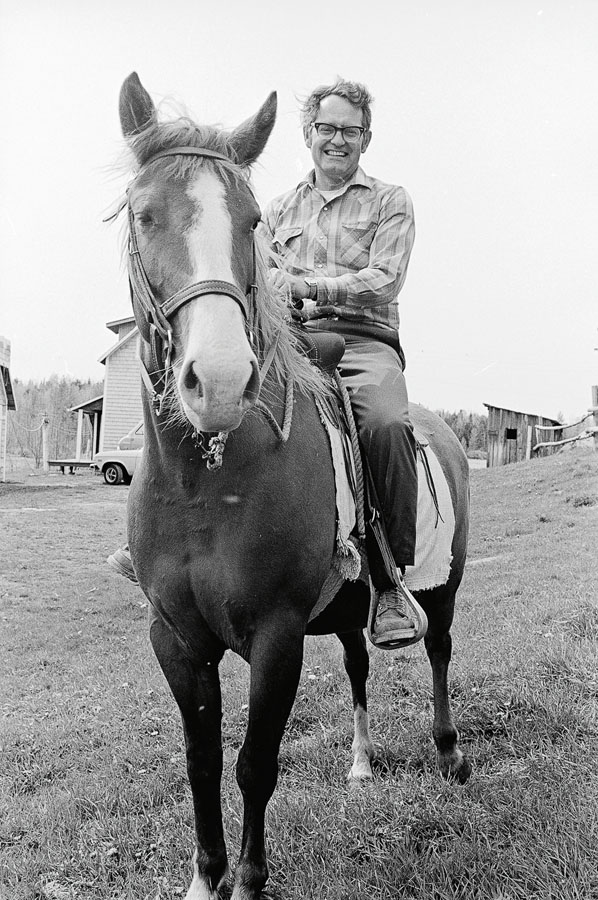 STUDY ABROAD: Over several years, Russell and Ruth Peck hosted Rochester classes at their farm in Ontario, Canada, where students met Butternut and other animals while studying medieval literature. (Photo: Adam Fenster)
STUDY ABROAD: Over several years, Russell and Ruth Peck hosted Rochester classes at their farm in Ontario, Canada, where students met Butternut and other animals while studying medieval literature. (Photo: Adam Fenster)“That was wonderful for me, and I learned a lot about teaching,” he says, wistfully.
“The farm is about 300 miles from Rochester, hours of driving into the country,” says Jarold Ramsey, a professor emeritus of English who knows something of Western living from his own youth in central Oregon, where he lives in his retirement. “Russell thought nothing of that trip, though it really was a long haul.”
Over the years Peck has been the faculty director of the Medieval House (now the Medieval Society), the Drama House, and its theater program. He was responsible for acquiring, in 1987, the collection of medieval texts that became the Robbins Library in Rush Rhees Library, a unique, working scholar’s collection of non-circulating (and thus, always available) material.
His Chaucer class still attracts robust enrollments, and he has introduced courses on subjects as varied as History of the English Language and Black Exploitation Films. The latter grew out of Peck’s response when the inner city of Rochester was rocked by race riots in the 1960s.
Peck labels the 1964 riots as the single most momentous event in his formative years at Rochester.
“That had an enormous impact on my thinking. I knew a lot about medieval literature, but little about contemporary race issues,” he admits. “The Rochester riots occurred before those in Newark and Watts. It was the beginning of a tumultuous time. The [Vietnam] war and shootings at Kent State forced me to re-educate myself about the society around me.”
In that turbulent era, when students were often portrayed as disaffected and rebellious, Peck’s effort to connect in and out of the classroom had a lasting impact. “The violence at Kent State in 1970 was a catastrophic jolt to the psyche of the campus,” remembers Debbie Watkins Moncrieff ’71, who is now an assistant professor at the University of Pittsburgh’s Department of Communication Science and Disorders. “There was a powerful feeling of empathy and camaraderie that sprang forth from those events, and Professor Peck was an active voice in those conversations. He cared deeply about the welfare of all students.”
Moncrieff vividly recalls Peck’s Chaucer and Middle English lectures. “It was hard not to be drawn in. He was such a performer in front of the class. There was a sparkle in his eye, his impish grin, that enormous intelligence and enthusiasm. He sang to us. He would pull out his tuning harp, and lead the class in rounds.”
Sara Cohen ’12, an English major from Silver Spring, Md., sat in on a Peck lecture when she was deciding if she wanted to attend Rochester. Once she enrolled, his was the first class she signed up for. “The course description for Classical and Scriptural Backgrounds included something like, ‘the course is this professor’s soul.’ I decided if a professor wrote that in the summary, I was going to enjoy that class, and I did.”
Since then, Cohen has gone with other English majors to Stratford, Ontario, each fall, to attend plays at the Stratford Shakespeare Festival, and this year was one of 23 students who took Theatre in England, a four-credit course in London that Peck has taught for 21 years. Also along were a few additional pilgrims, Don Chew ’79S (MBA), ’83 (PhD), who has worked with Peck to manage the finances for an innovative publishing project, and Janice Willett ’78S (MBA), a trustee who met the Pecks in 2002 when she attended a Plutzik reading in New York City.
Both Chew and Willett marvel at the organizational skills required for the London undertaking, which involves Russell and Ruth together shepherding students to at least two plays a day over two weeks during winter break, becoming, in effect, surrogate parents.
Peck says he starts looking for tickets in March, and spends hours searching for the right plays—this year ran the gamut from Hamlet, Measure for Measure, and Richard II, to War Horse and Cinderella, to works by Jean Paul Sartre and Neil LaBute—and the best seats. The syllabus is demanding and pleasantly exhausting. The group stays at the Harlingford Hotel, where each day starts with a 75-minute class held in the hotel lounge.
“In London, Russell will lecture in the morning, go to two plays, join us for a drink in the pub, then excuse himself to reread a play and prepare for the next day,” Chew says. “I don’t know how he does it. He doesn’t let anyone else grade his students’ papers, either.”
“After watching Russell in action, I have a better sense of what makes a good teacher,” says Willett, who has joined the Pecks in London for the past seven years. “He frames the discussion in a way that draws responses from the students, and he finds value in every response, which encourages more responses and leads to genuine insight. He gives the impression that he is learning as much as the students. And it’s hard to resist his own love of the subject. Those morning sessions have never failed to dazzle me.”
Imagine how the students feel. “The course was absolutely overwhelming, but in the best way possible,” says Cohen.
One evening Cohen found her energy waning. “Professor Peck must have noticed, and asked how I was doing. I admitted I was a little tired. I asked him how he was doing, and he responded, ‘Oh, you know me, I always have energy!’ This is constantly true.”
Since the late 1980s Peck has been the creator, chief editor, and driving force for the Middle English Text Series (METS), through the Consortium for Teaching Middle Ages (known as TEAMS). Dismayed that much of the material he wanted to teach was out of print, Peck embarked on the arduous task of producing accurate, authoritative texts that can be read easily in the original Middle English. With funding from the National Endowment for the Humanities and input from other medieval scholars, what began as a project to publish 25 texts has grown to more than 80 volumes, with more to come.
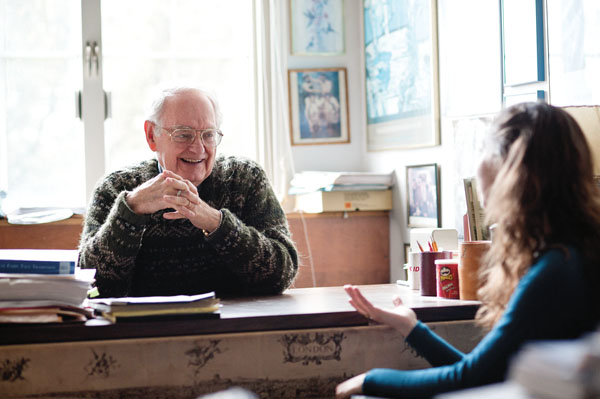 GENERATIONS OF ADVICE: Peck meets with English major Lillian Dickerson ’12 to discuss her honors thesis in his Morey Hall office. Peck also advised Lillian’s sister, Kathryn ’05, as a Take Five Scholar. (Photo: Adam Fenster)
GENERATIONS OF ADVICE: Peck meets with English major Lillian Dickerson ’12 to discuss her honors thesis in his Morey Hall office. Peck also advised Lillian’s sister, Kathryn ’05, as a Take Five Scholar. (Photo: Adam Fenster)Epitomizing ‘Everything That’s Good in Higher Education’
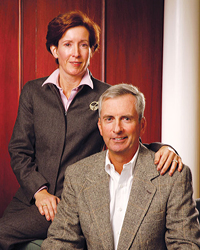 SCHOLAR SUPPORT: A gift from Janice and Joseph Willett honors Peck’s 50-plus-year career. (Photo: University Advancement)
SCHOLAR SUPPORT: A gift from Janice and Joseph Willett honors Peck’s 50-plus-year career. (Photo: University Advancement)Trustee Janice Willett ’78S (MBA) first met Russell and Ruth Peck in 2002 in New York City during a special event of the Department of English’s Plutzik Reading Series.
Having lived in England for many years, Willett enjoyed talking to the couple about London and the theater and found that they had seen many of the same productions.
Before long, the idea arose that Willett should join the Pecks in England for their regular, two-week winter break course on the theater.
“There aren’t many people who are happy seeing two plays a day, but to Russell, it’s almost a calling, and I was hooked,” says Willett. “One of my favorite things as a theater-goer is that fluttery feeling of excitement in the moment when the house lights go down and just before the curtain goes up, thinking about all the preparation that has gone into the production we are about to see. And one of the things I like best about Russell is knowing that he feels the same way, even if he’s just seen the curtain go up at another play five hours ago.”
Since then, Willett has joined the Pecks in London for seven such trips.
When she and husband Joseph ’75S (MBA) announced this spring that they were pledging $3.5 million to The Meliora Challenge: The Campaign for the University of Rochester, Willett made sure that an important part of the gift would be in honor of the Pecks, providing support for Russell’s work in the English department and recognizing Ruth’s role in Russell’s endeavors, particularly the London theater program. “The Russell and Ruth Peck Professorship will honor a half-century of dedication to this University,” she says. “My great hope is that all of their former students will contribute to making it possible.”
The commitment also provides support for student scholarships in the Simon School of Business as well as for the University’s International Theatre Program.
Willett says getting to know the Pecks has given her a new appreciation for the commitment it takes to make a difference in the lives of young scholars—and for the synergies of marriage.
“Our gift to the University in support of Ruth and Russell is because to me they epitomize everything that is good in higher education in the United States, along with everything about how a life should be lived.”
—Scott Hauser
For more about The Meliora Challenge, or to support the Peck Professorship, visit http://campaign.rochester.edu.
Peck calls the series the most significant work he’s done since he arrived at the University. And Hahn categorically agrees, “There is no other series comparable in any discipline. This is the single biggest influence on how medieval studies is taught around the world, the most important innovation of the 20th, now the 21st, century.”
The volumes will be perpetually in print, published through Western Michigan University, and sold at cost. But they’re also available online, in a searchable database, maintained out of the Robbins collection, and available to scholars around the world to use for free.
“Russell is here every day,” says Lupack. “He oversees every text, every line, every word.”
And nearly every graduate, as is evident in the English department’s annual diploma ceremony. Always orchestrated by Peck, the event is held in Hubbell Auditorium to accommodate an audience from across the University.
“The English department ceremony is unique,” says Lennie. “Diploma ceremonies are rare among colleges and universities to begin with, and special because they highlight the rich commerce that faculty and students have had together. But I know of no other place with a diploma ceremony such as what Russell creates. It’s legendary, the highlight of the academic year. It is, like the man himself, singular and distinctive.”
The ceremony began simply enough some 40 years ago as an intimate occasion at which faculty read from their specialty of study, performed a short play or two, and were led in song by Peck before graduates lined up to receive their diplomas, while holding long-stemmed peonies cut from Ruth and Russell’s perennial garden.
Here is what that has begot, circa 2011, still produced and stage-managed by Peck:
A multimedia production with hundreds of photos of the 70-plus graduating seniors taken during departmental outings throughout the year: theater-going in Stratford, Ontario; travels in England; Niagara Falls adventures; Mount Hope Cemetery in autumn; tobogganing in Highland Park; the lower falls of the Genesee; the Seneca Park Zoo; Eastview Mall in nearby Victor, N.Y.; and the senior picnic on Lake Ontario. The department still sings, and there are prose and poetry readings. And, of course, music, with recorded selections ranging from the Brahms Requiem to the Beach Boys to a song called “What Do You Do with a BA in English?” from the Broadway musical Avenue Q. There’s a harmonica rendition of “The Dandelion Yellow” played by Peck, who brings the proceedings to a fitting and emotional climax with a reading from Chaucer.
It’s “very moving—funny, sentimental, and spectacular,” in the words of its creator, who gets help from his colleagues but is still the ringmaster.
Did Peck plan to stay at Rochester for so long? “I never really thought in those directions. I always just liked what I was doing, and they were very good to me. I’ve been lucky in many ways,” says Peck, “and I’ve enjoyed good fortune here.
“I was the ‘mustard’ professor at the University of Hull [in England] in 1967–68,” Peck says, with a playful smile. “That was the old R. T. French/Reckitt-Coleman fellowship, and when I returned to Rochester, I was given tenure.” The rest is history.
Along the way, and to no one’s surprise, teaching has become the family profession. Ruth Peck had a long association with SUNY Geneseo, teaching music and piano, and still performs and plays as a soloist and collaborator in Rochester. The Pecks’ three children have achieved their own considerable success in the classroom: daughter Demaree is an award-winning high school English teacher in Virginia; Nathan is a high school science teacher with many awards in Missouri; and Gunther is a history professor at Duke University. It pleases Peck to no end that his children still spend time on the farm, as he and Ruth still do, for maple syrup making and timber harvesting.
And last, this: A graduate might discover among saved bits a blue examination book, the final in an upper-level course in Middle English literature. No copy of the questions, only the rush of answers, and not all of them correct, because Peck’s exams have always been famously difficult.
“It’s very hard,” he would whisper, as though someone else had devised the test and he only sneaked a peek. Peck’s written comments hop across the hurried essays, but there, at the end, is the approval every student seeks: “. . . with one of the highest quality.” Praise, in its simplest form.
If we’re lucky we encounter teachers, colleagues, and friends who help us decipher our way forward. And when we’re truly blessed, there is that one, that singular one, whose own journey, by word and deed, stands as a beacon.
Russell Peck. One. Of the highest quality.
Myra Gelband ’71 is a retired senior editor for Sports Illustrated.
